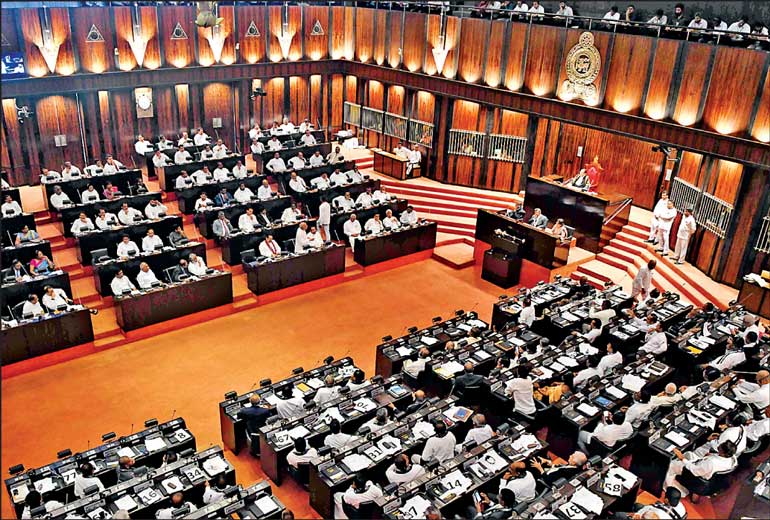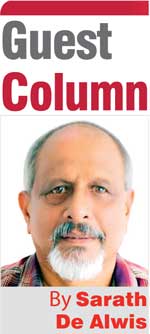Monday Feb 16, 2026
Monday Feb 16, 2026
Tuesday, 3 October 2023 00:08 - - {{hitsCtrl.values.hits}}
 It is a provocative call for much needed reforms that will place checks and balances to restrain politicians and unelected officialdom from controlling our lives with disdain at best and impunity at the worst
It is a provocative call for much needed reforms that will place checks and balances to restrain politicians and unelected officialdom from controlling our lives with disdain at best and impunity at the worst
The IMF’s Governance Diagnostic Assessment leads us to one irrevocable conclusion. We cannot go any further with the current composition in Parliament. The Governance Diagnostic Assessment exposes the empty rhetoric of President Ranil Wickremesinghe’s ‘Walhalla’ in 2048. Incidentally the phrase ‘manor born’ is also from Hamlet. The IMF team’s assessment is that of a roadmap rooted in reason driven by a clear-sighted authenticity. It is not a handbook for an autocrat or a survival kit for outdated elitism
 Apart from being a poet and playwright William Shakespeare was an incisive political commentator.
Apart from being a poet and playwright William Shakespeare was an incisive political commentator.
In ‘Hamlet’ he has a lowly sentry Marcelus keeping watch on the battlements of the king’s castle noticing the reappearance of the ghost of the king delivering the famous line “There is something rotten in the state of Denmark.”
The insignificant sentry has the insight to take note of dark happenings as signs of a terrible infirmity that grips the kingdom.
The much awaited ‘Governance Diagnostic Assessment of Sri Lanka’ by an IMF team has now been released. It is a riveting read. When you finish reading the 125-page dossier you cannot help but lament as Hamlet himself: “That it should come to this!”
With surgical precision and disarmingly cool detachment it exposes the murky depths of our political system. It doesn’t sidestep the bond deal of 2015.
It exposes the duplicity and fudging in our public life. It is an unmistakable articulation of what needs to do if we are to emerge from our collective amnesia to crawl out of this moral, political, and financial gorge we are trapped in.
It is a provocative call for much needed reforms that will place checks and balances to restrain politicians and unelected officialdom from controlling our lives with disdain at best and impunity at the worst.
Something is rotten in the state of Denmark is not the only memorable line in Hamlet. It has several others that are relevant to our current predicament. The first of course is ‘neither a borrower nor lender be’. Then there is ‘hoist with one’s own petard’, ‘method in one’s madness’.
The IMF’s Governance Diagnostic Assessment leads us to one irrevocable conclusion. We cannot go any further with the current composition in Parliament.
The Governance Diagnostic Assessment exposes the empty rhetoric of President Ranil Wickremesinghe’s ‘Walhalla’ in 2048. Incidentally the phrase ‘manor born’ is also from Hamlet.
The IMF team’s assessment is that of a roadmap rooted in reason driven by a clear-sighted authenticity.
It is not a handbook for an autocrat or a survival kit for outdated elitism.
Following are extracts from the Governance Diagnostics Assessment which I found to be irresistibly quotable.
Gotabaya Presidency:
“The particular configuration of power under the Presidency of Gotabaya Rajapaksa created unique governance challenges. The excessive concentration of authority in the hands of a group of individuals tightly linked by familial ties served to emphasise the political power of a small elite and perhaps assisted in the coordinated improper use of public power.5 While the Rajapaksa Government lasted less than three years from its start in November 2019, its time in office featured catastrophic declines in tax revenues, the signing of investment agreements negotiated in opaque circumstances granting control over state property and extensive long-lasting concessions, as well as dramatic increases in external and domestic debt.”
On corruption vulnerabilities:
“Corruption vulnerabilities are exacerbated by weak accountability institutions, including the Commission to Investigate Allegations of Bribery and Corruption (CIABOC) that have neither the authority nor competency to successfully fulfil their functions.”
Conduct of public servants:
“Current governance arrangements have not established clear standards for permissible official behaviour, acted to deter and sanction transgressions, nor pursued individuals and stolen public funds that have exited the country.
Civil society emasculation:
“Regular civil society participation in oversight and monitoring of government actions is restricted by limited transparency, the lack of platforms for inclusive and participatory governance, and by broad application of counter-terrorism rules.”
Who guards the guardians?
Problematic structural issues that shape governance dynamics include the compromised independence of key governance institutions, critical gaps in the legal and regulatory infrastructure for managing and overseeing public resources, limited fiscal discipline and transparency, and a disorganised regulatory and legislative process that provides for insufficient review and engagement.
Resisting contemporaneous progress:
Minimal progress has been made in integrating modern information technology into public sector operations and public-private interfaces, or in linking information to detect and correct inefficiencies and improprieties. These governance features form the basis for the substitution of informal mechanisms of control for rule-based system of accountability for performance and integrity over an expansive state. The impunity for misbehaviour enjoyed by officials undermines trust in the public sector and compounds concerns over limited access to efficient and rule-based adjudication process for resolving disputes.
SriLankan Airlines, tax on sugar and bonds:
Perceptions of the pervasiveness of grand corruption in Sri Lanka may be influenced by extensively reported transgressions involving high-level officials and economic elites.
Governmental reviews and investigations regarding specific cases, including SriLankan Airlines’ interactions with Airbus, the decision to sharply reduce the import tax on sugar in 2020, and the events around the issuing of bonds in February 2015, produced extensive public information on incidents involving high-level officials. While each of these examples differs in important aspects, they share common features in that they involve multiple state entities, including the Central Bank, that generated extensive profits for private parties while simultaneously saddling the state with costly debts. While each case is distinct, in all instances, high-level officials escaped sanctioning for corruption, including in foreign jurisdictions in one case.
How officials are insulated from accountability:
“Government control over key enterprises limits the ability of market forces to discipline government policies and rent-seeking behaviour. Extensive government regulation in core sectors, such as agriculture, electricity, and construction, restricts market-based accountability and generates extensive opportunities for top officials to direct state resources to privileged private parties. Internal sources of accountability, such as regulatory bodies, inspectorates or internal audit functions, lack capacity and authority and are regularly circumvented by a high-degree of discretion afforded to high-level officials, and by extensive mechanisms for exerting informal influence on decision-making and the application of regulations. Government decisions relating to capital investments, high-value procurement, the granting of concessions for “strategic” investments, the marketing and payment of debt instruments, or the divestiture of state property occur through opaque processes at the highest level of government with limited oversight and contestation. External mechanisms of accountability, such as auditing and parliamentary oversight, have proven to be ineffectual in constraining questionable behaviour, in part due to the absence of effective follow-up mechanisms for actions that waste public resources. The absence of functional relationships with external law enforcement agencies enables officials to enjoy the profits of their illicit actions outside the country.”
What happened to the FCID:
The experience of the Financial Crimes Investigation Division (“FCID”) is instructive concerning the challenges faced in efforts to establish an outcome-oriented anticorruption effort. The FCID was formed in 2015 under the Sri Lanka Police Service and given direct responsibility for conducting investigations of serious financial fraud throughout the country and provided the authority to undertake investigations and arrest suspects without the prior approval of the Attorney General.
With support from the Serious Fraud Office of the UK, the FCID actively delivered its mandate, charging a number of ministers and other high-profile officials with corruption offences. The FCID’s existence was challenged at the Cabinet level in 2019, and the division was subsequently brought under the direct control of the Criminal Investigation Department.
How politics impedes investigations:
“Recently, political considerations have often appeared to dominate work on confronting corruption. The ‘Presidential Commission of Inquiry appointed to investigate Serious Acts of Fraud and Corruption (PRECIFAC)’ was established by President Sirisena in 2015 to investigate large-scale acts of fraud and corruption between the years of 2010–2015 (during the tenure of the previous administration). The Commission concluded in its final report of 2018 that former President Rajapaksa and 12 others had committed the offence of corruption, conspiracy to commit corruption and other offences under Section 70 of the Bribery Act. However, CIABOC was prevented from lawfully pursuing these cases until 2019 when the Commissions of Inquiry (Amendment) Bill was approved in Parliament. The Rajapaksa Government that came to power at the end of 2019 quickly sidelined prosecutions, instead electing to establish its own special Commission of Inquiry into alleged corruption between 2015–2019 (during the term of the previous administration). In the end, high-profile special commissions on corruption served to highlight the severity of corruption, demonstrate the dysfunctionality of formal anticorruption structures, while failing to hold anyone to account for their behaviour. “
Effectiveness of the revamped CIABOC:
The effectiveness of CIABOC hinges on the selection and appointment of vigorous and dedicated Commissions who have the expertise, experience, and qualities needed to fulfil the organisational mandate. The ACAACA establishes the Agency as an independent entity. The extent to which it acts as such and serves its ambitious function will be heavily influenced by the manner in which senior CIABOC officials, including the Director General and the Commissioners, are selected and appointed. The selection process for the Director General and the Commissioners must ensure that suitably qualified and experienced candidates are appointed and that the process is free from external interference, whether political or otherwise.15 There cannot be any question that these processes are fair, above-board, and transparent. A failure to ensure any of this will lead to charges of bias, improper influence and, inevitably, will impair the Commission’s reputation – and crucial public faith and trust in its functions.
Declaration of assets:
“Sri Lanka should establish a phased approach to implementing new asset declaration requirements, emphasising early publication of asset declarations of prominent officials followed by the building out of the entire system. A delay of several years in the publishing of asset declarations, as CIABOC works to design and operationalise a new digital system and deal with the sheer volume of submissions, would undermine the dynamics of governance change and endanger the momentum of the reform process. Priority should be given to receiving and publishing comprehensive Asset Declarations of senior officials in the short term, even in advance of the creation of a fully digitised process. Demand for verified electronic information for an expanded number of public officers will increase pressure on officials to fully implement the sequenced action plan in the near term.”
The role of civil society:
“As recent experience has shown, civil society has a vital role to play in demanding accountability from public officials and directly contributing to better governance and integrity. Effective governance arrangements work to enable non-state parties to participate in monitoring public sector performance, through inclusive and participatory processes. Until now, this chapter has largely focused on anticorruption efforts led by, and largely involving state actors. Anticorruption efforts are unlikely to achieve their objectives unless they also encompass initiatives designed and led by groups outside of government who are committed to rule-based inclusive economic and social progress.”
You may have your own views about the IMF and the International Global Economic Order. But these are troubled times. We cannot go forward by looking backwards. The Governance Diagnosis Assessment by the IMF team is distilled common sense relying on some semantic devices to minimise the glare of harsh reality.
It is a must read.
References:
https://www.imf.org/en/Publications/Search?#sort=relevancy&f:series=[COUNTRYREPS]&DateTo=12%2F31%2F2023&DateFrom=1%2F1%2F2023